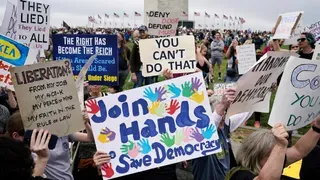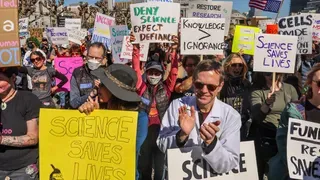June 7, 2010
Study: Children of Lesbian Couples Do Better
Kilian Melloy READ TIME: 5 MIN.
Anti-gay groups claim again and again that children with two parents of the same gender are "at risk" because their family does not live up to the ideal of a mother and a father. To bolster those claims, anti-gay activists point to studies that show that children from single-parent homes fare worse than their peers, and are prone to problems in later life such as depression and substance abuse.
The problem with those studies is that they have nothing to do with children brought up by two attentive, loving parents; they focus on the children of heterosexual single mothers. Reputable studies focusing on children from stable, two-parent homes have long shown that children with sufficient care and guidance from involved, supportive parents do equally well whether their parents are of the same or opposite genders.
But new research challenges even this notion, reports a June 7 Time Magazine article. Because many of the lesbian mothers studied in earlier projects had been married to men first and come out as lesbians at some point after childbirth, a new study sought to examine the effects on children of growing up from infancy with two mothers. The provocative result: when children are born into two-mother households, they seem to do even better than their peers.
The study appeared on the same day in Pediatrics. The study authors are University of California psychiatry professor Nanette Gartrell and University of Amsterdam behavioral scientist Henry Bos. The Time article said that the authors looked at the children of two-female households as opposed to two-male households because two-father families are rarer than two-mother families--partly because it's much more difficult for two men to plan a family than it is for two women.
The new study reaffirmed the results of earlier investigations, showing that children with two female parents (or even one lesbian mother) did as well as their peers with heterosexual parents, with their development and socialization being as good as those of children with one parent of each gender. But in certain ways, children with two mothers did even better, demonstrating higher levels of self-confidence and academic performance--not to mention fewer behavioral problems.
"We simply expected to find no difference in psychological adjustment between adolescents reared in lesbian families and the normative sample of age-matched controls," Gartrell told Time. "I was surprised to find that on some measures we found higher levels of competency and lower levels of behavioral problems. It wasn't something I anticipated."
The early-life aspect of having lesbian mothers seemed to be crucial in another way: in cases where two mothers split up, the children's' higher scores were unaffected, the Time Magazine article recounted. Children of lesbian mothers achieved their higher scores despite nearly half (41%) saying that they were the subjects of ostracism and taunts at school because they had two mothers and no father. While being targeted for harassment at school was more stressful for 10-year-olds, the children learned to cope in their teen years and no higher levels of stress were found.
"Obviously there are some factors that may include family support and changes in education about appreciation for diversity that may be helping young people to come to a better place despite these experiences," Gartrell noted, going on to theorize that since lesbian mothers are "very involved in their children's lives" such higher scores might be the result. "Being present, having good communication, being there in their schools, finding out what is going on in their schools and various aspects of the children's lives is very, very important," said Gartrell. Moreover, lesbian parents do not shy from discussing tough issues with their children--partly because their children are prone to being harassed at school. In the end, despite being subject to a certain level of ostracism, the children of lesbian parents turn out better adjusted.
Earlier this year, a Canadian study showed that children of gay adoptive parents did as well as the adopted children of heterosexuals, Canada.com reported.
"We found that sexual orientation of the adoptive parents was not a significant predictor of emotional problems," said East Carolina University's Paige Averett. "We did find, however, that age and pre-adoptive sexual abuse were." Averett, Blace Nalavany (also of East Carolina University), and the University of Texas School of Social Work's Scott Ryan interviewed gay parents from around the U.S., and also drew on information from the child welfare system of the state of Florida.
Averett, Blace Nalavany, also of East Carolina University, and Scott Ryan, dean of the University of Texas School of Social Work, questioned nearly 1,400 couples in the United States, including 155 gay and lesbian parents.
"There are implications for social work educators, adoption professionals, and policy makers in this and other recent studies," Averett said. "We must pay attention to the data indicating that gay and lesbian parents are as fit as heterosexual parents to adopt, because at least 130,000 children are depending on us to act as informed advocates on their behalf."
Child welfare and health professionals have long advocated for full legal family parity, for the benefit of the children of gays and lesbians as much as for the adults' rights to have their relationship legally recognized and protected. A Wikipedia article noted that in 2006, the American Academy of Pediatrics stated, "Conscientious and nurturing adults, whether they are men or women, heterosexual or homosexual, can be excellent parents. The rights, benefits, and protections of civil marriage can further strengthen these families."
Moreover, the Canadian Psychological Association stated in 2004 that, "Beliefs that gay and lesbian adults are not fit parents, or that the psychosocial development of the children of gay and lesbian parents is compromised, have no basis in science. Our position is based on a review representing approximately 50 empirical studies and at least another 50 articles and book chapters and does not rest on the results of any one study." The CPA repeated that statement in 2006.
Some states in the U.S. have adoption-related laws discriminating against gay and lesbian families. One such state is Florida, which lost a federal court case challenging the state's gay adoption ban; that case relied on testimony from anti-gay activist George Rekers, the Family Research Council co-founder who hired a 20-year-old male escort to accompany him on a European jaunt. Rekers served as a paid expert witness for the state in the adoption case, receiving $120,000 in taxpayer money in 2007 and 2008 for his testimony. The judge in the case, Cindy Lederman, cited Rekers' testimony specifically, calling it neither "credible nor worthy of forming the basis for public policy." The state appealed Lederman's ruling. The authors of the adoption study drew on information from the Florida child services department.
Kilian Melloy serves as EDGE Media Network's Associate Arts Editor and Staff Contributor. His professional memberships include the National Lesbian & Gay Journalists Association, the Boston Online Film Critics Association, The Gay and Lesbian Entertainment Critics Association, and the Boston Theater Critics Association's Elliot Norton Awards Committee.







